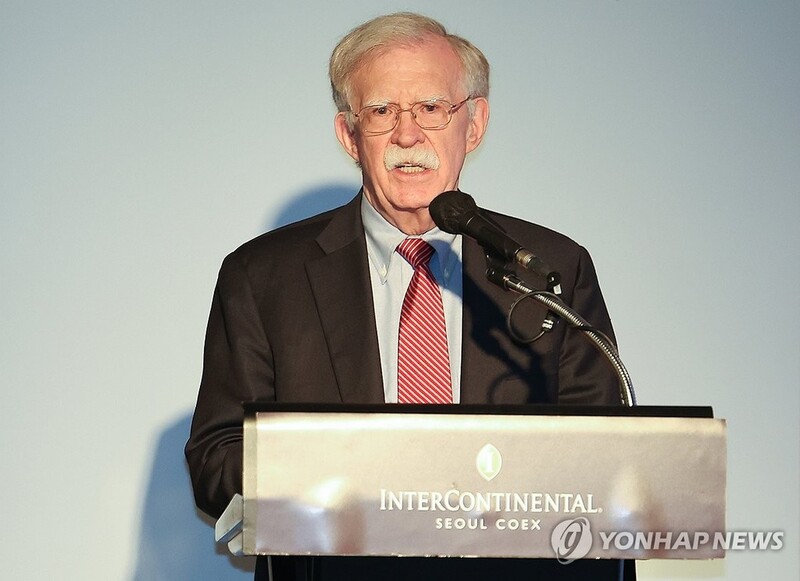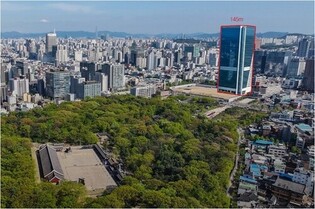 |
| ▲ Former U.S. National Security Adviser John Bolton speaks during an event hosted by the Korea Finance for Construction (FINCO) at a hotel in southern Seoul on June 25, 2024. (Yonhap) |
Bolton-S Korea
Redeploying tactical nuclear weapons to S. Korea could strengthen nuclear umbrella against Russia-N.K. threats: Bolton
By Kim Seung-yeon
SEOUL, June 25 (Yonhap) -- Former U.S. National Security Adviser John Bolton said Tuesday that the redeployment of U.S. tactical nuclear weapons to South Korea could enhance its deterrence against North Korean threats amid Pyongyang's deepening ties with Russia.
Bolton also said South Korea should do more for security in the Indo-Pacific region, suggesting it should join the QUAD security partnership as a fifth member.
"In Korea, I don't think it would necessarily increase deterrence to begin a nuclear weapons program here. ... More countries that get nuclear weapons, even reliable friends, make it riskier that we would have a nuclear exchange started by somebody, somewhere," Bolton said during an event hosted by the Korea Finance for Construction (FINCO) in Seoul.
"What could help would be to strengthen the nuclear umbrella in the near term by bringing U.S. tactical nuclear weapons back to the peninsula, to say to (North Korean leader) Kim Jong-un, 'We're right here and ready if you try anything,'" Bolton said.
Bolton's remarks came as calls for stronger deterrence, or even South Korea to go nuclear, have gained traction amid concerns over the growing military cooperation between Moscow and Pyongyang.
Concerns have intensified after Russian President Vladimir Putin's trip to Pyongyang last week, as Putin and Kim declared their new partnership under a treaty that commits them to providing military support in case either is put under an armed attack.
Tactical nuclear arms refer to battlefield weapons with relatively lower yields, compared with relatively higher yield "strategic" weapons usually carried by longer-range delivery vehicles, such as ICBMs, submarine-launched ballistic missiles or long-range bombers.
U.S. tactical nuclear weapons were withdrawn from the Korean Peninsula in 1991. South Korea has since adhered to its non-nuclear status while relying on America's security commitment.
On Putin's recent trip to North Korea, Bolton said that Kim used it to show to China that he was "capable of playing between Russia and China, like his grandfather," the North's founder, Kim Il-sung.
"To the extent North Korea's leverage between Russia and China has increased, that is a problem for South Korea because it means that the North is stronger and has potentially greater support than it did when the North relied almost entirely on China," he said.
The U.S. believes that the North has been providing Russia with weapons and other munitions for use in the war with Ukraine, in exchange for Moscow's assistance in North Korea's space programs, which ultimately require similar technologies to make ballistic missiles.
The changing dynamics, or "a new alignment" being formed around China and Russia with "satellite countries" like North Korea, calls for boosting trilateral or greater security cooperation among the U.S. and like-minded countries, Bolton said.
"My view is that South Korea shouldn't be a part of the Quad, we should make it a 'Quint,'" he said, referring to the Quad security partnership, comprising the U.S., India, Japan and Australia.
Bolton also suggested South Korea take part in the AUKUS forum involving the U.S., Britain and Australia.
"For South Korea, the whole thinking about the bigger picture behind the obvious threat from Kim Jong-un in the North is important here," he added.
(END)
<저작권자(c) 연합뉴스, 무단 전재-재배포, AI 학습 및 활용 금지>
(C) Yonhap News Agency. All Rights Reserved


































